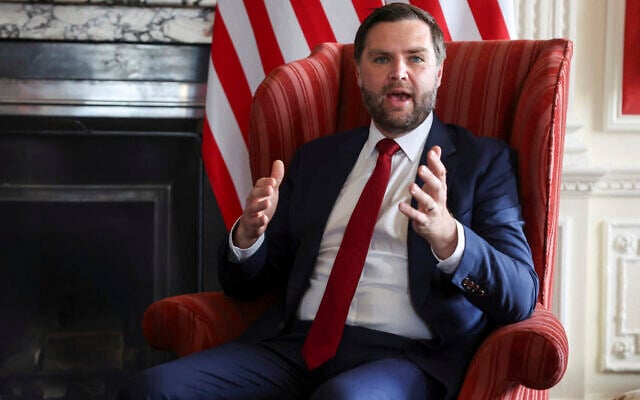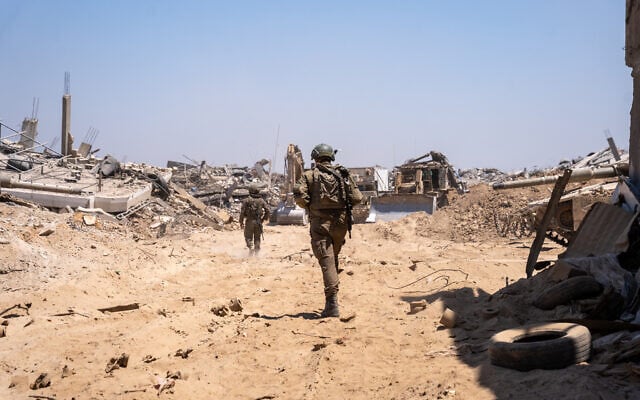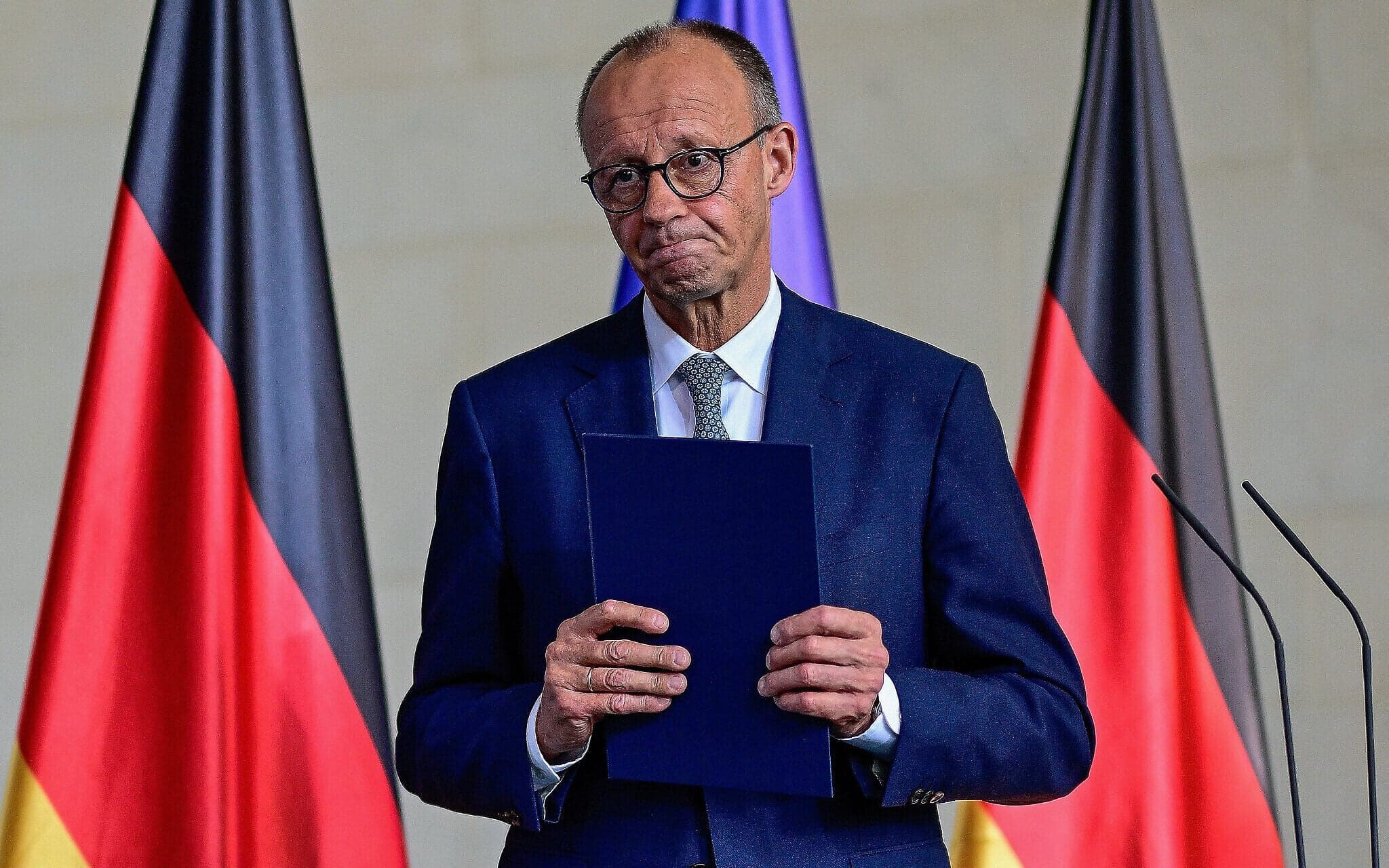Germany vowed Friday to suspend sales of arms to Israel that could be used in Gaza, as European and Arab nations slammed the cabinet’s decision to conquer Gaza City after 22 months of war against Hamas.
The cabinet decision bucked IDF warnings that the expanded fighting could endanger the remaining hostages in Gaza and deepen the humanitarian disaster there.
The planned Gaza City takeover has sparked fierce domestic criticism from the Israeli opposition and hostage families, as well as international condemnations from the United Nations, China, Russia, Britain and other countries.
While US President Donald Trump said earlier this week that it was up for Israel to decide whether or not to occupy all of Gaza, US Vice President JD Vance admitted Friday after the cabinet decision that Washington has “some disagreement” with Jerusalem regarding the latter’s prosecution of the war in Gaza, even though the US shares Jerusalem’s objectives.
Asked by reporters during a visit to the UK about the Israeli cabinet’s decision, Vance began by saying that the administration’s two main goals are ensuring that Hamas cannot continue to attack innocent people and solving the humanitarian crisis in Gaza.
“There are a lot of common objectives here. There is some disagreement about how exactly to accomplish those common objectives,” Vance says.

“We’re not going to know exactly how to solve a very complicated problem… If it was easy to bring peace to that region of the world, it would have been done already,” the US vice president added.
Pressed on whether the US agrees with the UK plan to recognize a Palestinian state, Vance indicated that the UK has the right to make its own decision on the matter. However, he reiterated that the US will not be following suit.
“I don’t know what it would mean to recognize a Palestinian state given the lack of a functional government there,” he says.
Meanwhile, in a major change of course for Berlin, German Chancellor Friedrich Merz said “the German government will not approve any exports of military equipment that could be used in the Gaza Strip until further notice.”
Merz, whose country is Israel’s second-biggest arms supplier after the United States, acknowledged Israel’s right to disarm Hamas and seek the release of the remaining 50 hostages, but said Israel’s decision “makes it increasingly difficult to see how these goals can be achieved.”
The release of hostages and ceasefire negotiations were Germany’s top priorities, along with alleviating civilian suffering in Gaza, said Merz. He also urged the Israeli government not to take any further steps towards annexing parts of the West Bank.

Merz held a phone call with Netanyahu on Friday during which the latter expressed his disappointment over the German decision, according to an Israeli readout.
Employing the argument Israeli officials make in response to most international criticism of its prosecution of the warm Netanyahu said Germany was “rewarding Hamas terrorism.”
Netanyahu also insisted that Israel’s goal is not to take over Gaza isn’t to permanently take over Gaza, rather to remove Hamas from power so that “a peaceful government to be established there,” the readout from his office said.
Germany’s steadfast and long-standing support for Israel following the Holocaust has been badly strained by Gaza’s mounting death toll and humanitarian crisis, which have prompted demands from the German public for government action.
According to the Stockholm International Peace Research Institute, Germany provided 30% of Israel’s major arms imports in 2019-2023, primarily naval equipment, including Sa’ar 6-class frigates (MEKO A-100 Light Frigates), which have been used in the Gaza war.
‘Must be reconsidered’
European nations also assailed the decision to take over Gaza City, as European Union chief Ursula von der Leyen urged Israel to reconsider.
“The Israeli government’s decision to further extend its military operation in Gaza must be reconsidered,” said von der Leyen on X, calling for a ceasefire, the release of all hostages and “immediate and unhindered access” for humanitarian aid in Gaza.
Belgian Foreign Minister Maxime Prévot summoned Israeli ambassador Idit Rosenzweig-Abu, Belgium’s foreign ministry said Friday.
In a statement, the ministry said Belgium wants to “express (its) total disapproval of this decision, but also the continued colonization…and the desire to annex the West Bank,” adding that it will “vigorously advocate” for a reversal of Israel’s decision.

Danish Foreign Minister Lars Lokke Rasmussen also told Denmark’s TV2 on Friday that the Israeli decision was wrong and should immediately be reversed, while Dutch Foreign Minister Caspar Veldkamp said the plan to intensify operations in Gaza was “a wrong move.”
“The plan of the Netanyahu government to intensify Israeli operations in Gaza is a wrong move,” Velkamp said in a statement on X. “The (Gaza) humanitarian situation is catastrophic and demands immediate improvement. This decision in no way contributes to this and will also not help to get the hostages home.”
Russian deputy ambassador to the United Nations also conveyed Moscow’s opposition to the Israeli plans, saying at a press briefing at the UN headquarters in New York that “We think that this is a very bad step in an absolutely wrong direction, and we condemn this kind of action.”
The actions “run counter to all the UN decisions on the Palestine-Israeli conflict,” he said, according to comments carried by Turkish state news agency Anadolu.
Abbas speaks with Arab leaders amid regional anger at Israel
Saudi Arabia on Friday rejected Israel’s plan to take over Gaza City, lambasting it for the “starvation” and “ethnic cleansing” of Palestinians in the blockaded territory.
Riyadh said it “condemns in the strongest and most forceful terms the decision of the Israeli occupation authorities to occupy the Gaza Strip,” in a foreign ministry statement on X.

It added that Saudi Arabia “categorically condemns its persistence in committing crimes of starvation, brutal practices and ethnic cleansing against the brotherly Palestinian people.” Israel denies creating starvation conditions in the Gaza Strip and accuses the UN and Hamas of impeding the distribution of aid.
Palestinian Authority President Mahmoud Abbas called for international action to stop what he said were Israel’s “dangerous” plans to “fully occupy the Gaza Strip,” according to the PA’s official news agency WAFA.
Abbas reiterated the message in phone calls Friday with his Egyptian counterpart Abdel-Fattah el-Sissi and with Jordan’s King Abdullah II, WAFA reported. The Egyptian foreign ministry and the Hashemite royal court both later issued statements affirming their rejection of Israel’s plans.
Egypt has warned in a message to the US that the Israeli proposal would lead to Hamas executing Israeli hostages it is holding, according to an Egyptian diplomat cited by Lebanese newspaper Al-Akhbar.
According to the report, Hamas and the other terror groups holding the hostages “have orders to ‘neutralize’ them if their captors come under siege and are unable to escape alive.”
The report also stated that senior Egyptian officials have demanded an urgent return to the negotiating table between Israel and Hamas regarding a ceasefire in Gaza, and that Sissi has requested to be in direct contact on the matter with US President Donald Trump.

Hamas on Friday demanded that the United States and international courts stop Israel from carrying out its planned takeover.
The terror group said Israel’s plans were proof that Netanyahu and his government disregard the lives of the hostages, as the government knows that expanding the military operation “will lead to their sacrifice.”
According to the statement, Israel’s decision explained why the country last month abruptly withdrew its negotiators from ceasefire-hostage talks, which Hamas said were “on the verge of reaching a ceasefire agreement.”
Israel and the US pulled their negotiating teams from Doha late last month after Hamas requested amendments to a partial ceasefire and hostage release deal that the two countries found unacceptable.

